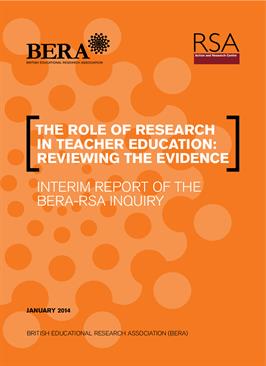While many might assume that research should make some contribution to high quality teacher education, BERA and RSA ask precisely what that contribution should be: to initial teacher education, to teachers’ continuing professional development and to school improvement. They also ask how different teacher education systems currently engage with research and what international evidence there is that linking research and teacher education is effective.
At a time when virtually every government around the world is asking how it can improve the quality of its teaching force,the British Educational Research Association (BERA) and the RSA have come together to consider what contribution research can make to that improvement.
High quality teaching is now widely acknowledged to be the most important school-level factor influencing student achievement. This in turn has focused attention on the importance of teacher education, from initial training and induction for beginning teachers, to on-going professional development to help update teachers’ knowledge, deepen their understanding and advance their skills as expert practitioners. Policy-makers around the world have approached the task of teacher preparation and professional development in different ways, reflecting their distinctive values, beliefs and assumptions about the nature of professional knowledge and how and where such learning takes place.
At a time when teacher education is under active development across the four nations of the United Kingdom, an important question for all those seeking to improve the quality of teaching and learning is how to boost the use of research to inform the design, structure and content of teacher education programmes.
The Inquiry aims to shape debate, inform policy and influence practice by investigating the contribution of research in teacher education and examining the potential benefits of research-based skills and knowledge for improving school performance and student outcomes.
There are four main ways that research can contribute to programmes of teacher education:
- The content of such programmes may be informed by research-based knowledge and scholarship, emanating from a range of academic disciplines and epistemological traditions.
- Research can be used to inform the design and structure of teacher education programmes.
- Teachers and teacher educators can be equipped to engage with and be discerning consumers of research.
- Teachers and teacher educators may be equipped to conduct their own research, individually and collectively, to investigate the impact of particular interventions or to explore the positive and negative effects of educational practice.
At present, there are pockets of excellent practice in teacher education in different parts of the UK, including some established models and some innovative new programmes based on the model of ‘research-informed clinical practice’. However, in each of the four nations there is not yet a coherent and systematic approach to professional learning from the beginning of teacher training and sustained throughout teachers’ working lives.
There has been a strong focus on the use of data to inform teaching and instruction over the past 20 years. There now needs to be a sustained emphasis on creating ‘research-rich’ and ‘evidence-rich’ (rather than simply ‘data-rich’) schools and classrooms. Teachers need to be equipped to interrogate data and evidence from different sources, rather than just describing the data or trends in attainment.
The priority for all stakeholders (Government, national agencies, schools, universities and teachers’ organisations) should be to work together to create a national strategy for teacher education and professional learning that reflects the principles of ‘research-informed clinical practice’. Rather than privileging one type of institutional approach, these principles should be applied to all institutional settings and organisations where teacher education and professional learning takes place.
Further consideration needs to be given to the best ways of developing such a strategy, in consultation with all the relevant partners.
pdf 844 KB
Contributors


Join the discussion
Comments
Please login to post a comment or reply
Don't have an account? Click here to register.
intrestung info